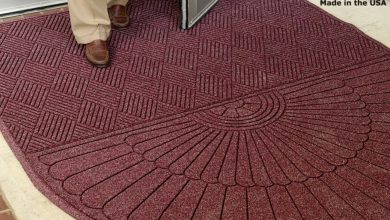How to Change a Honeywell Thermostat Battery?

There’s nothing worse than bad weather rolling in.
This brings extreme cold or hot temperatures with it – and the batteries in your Honeywell thermostat dying.
Unfortunately, that’s what seems to always happen!
Luckily, though, it really doesn’t take all that much to learn how to change a Honeywell thermostat battery. This process is really simple and straightforward, and we break it down (step-by-step) for you below.
Just use this quick guide to tackle this project the next time that your thermostat batteries go dead and keep your home hot and cool properly.
How to Change a Honeywell Thermostat Battery Steps?
Before you go through the process of actually changing your Honeywell thermostat batteries.
It’s a good idea to record the day that you notice the batteries die.
This will give you a good idea to measure the lifetime of your batteries.
But it’s also going to give you a good general idea of when you should replace them.
It allows you to jump out ahead of things, swapping them out before they die completely.
Now let’s get into the nuts and bolts of actually change Honeywell thermostat battery.
How to Confirm the Honeywell Thermostat is Not Hardwired?
The very first thing you need to do before you touch a Honeywell thermostat installed.
Some battery operated thermostats (including a bunch from Honeywell) are actually hardwired. You’ll still get the dead battery alert, but your thermostat will continue to work.
That’s not the issue, though.
The problem is that if you try and pop the thermostat off the wall while it is connected to live electricity. You run the risk of electrocuting yourself, starting an electrical fire, or causing a whole host of other issues you’d really rather avoid completely.
Confirm that the thermostat is 100% battery-operated before you touch anything. If it is connected to live power, shut off the circuit breaker, disconnect the power source, and then run through the instructions outlined below.
Remove the Thermostat from the Wall
Now is the time to pull your thermostat off of the wall, making sure not to destroy the mounting system or damage your walls.
This is usually a pretty simple and straightforward process. Most Honeywell thermometers secure to the wall with adhesive strips or slide on two screws that have been installed in the wall already.
The thermostat should come off of the wall, though, so that you have an easier time taking the battery compartment off and getting the batteries out.
Remove the Battery Compartment Cover
And that brings us to the next piece of the puzzle – removing the battery compartment cover from the Honeywell thermostat itself.
Most of the time this is only going to involve gently pushing the battery cover one way or another (there’s usually an indicator arrow letting you know which way to go). Sometimes, though, you’ll have to snap the cover off, pull a little lever to release the cover, or toggle a switch to release the locking mechanism.
At the end of the day, though, you need to get the battery compartment cover off before you can access the dead batteries themselves.
Remove and Dispose of Old, Worn Out Batteries
It should come as no surprise to anyone what this next step is, and that’s removing and disposing of the older, worn out, no longer operating batteries.
The overwhelming majority of Honeywell thermostats on the market today run off of two AA batteries.
All you have to do is pop the old batteries out, making a mental note of their orientation so that you can be sure to put the new batteries in correctly.
There are a lot of different ways to dispose of these old batteries safely and effectively. Make sure that you take care of these batteries, though, as they can leach toxic chemicals and heavy metals into the earth if they are not disposed of correctly.
Pop New, Fresh Batteries Into the Battery Compartment
All that’s left to do here is pop in a new set of fresh, replacement batteries that have 100% “juice” left in them.
Make sure that you are replacing the old Honeywell thermostat batteries with brand-new batteries, though.
Some people are tempted to swap out newer (but not totally new) batteries. To find themselves really frustrated later down the line when they have to swap out these batteries for new batteries a lot sooner than they thought.
Always swap out with fresh batteries and this won’t be a problem.
Confirm the Thermostat is Working Correctly
Before you do anything else after replacing with fresh batteries you’ll want to confirm that the thermostat is working correctly.
Far too many people slide the battery cover back on and stick the thermostat back on the wall before they confirm that everything is good to go.
Then they discover that it wasn’t the batteries that died but another problem completely.
You have to pop the thermostat off the wall again to remove the battery cover, and troubleshoot the issue.
You can avoid all that headache and hassle by confirming. Once you know that for sure you can move on to the neck step.
Replace the Battery Cover
Replacing the actual battery cover itself is really simple and straightforward.
All you have to do is reverse the process of actually removing the battery cover. This time instead locking it in place securely.
Snap the Honeywell Thermostat Back on the Wall
The final step of this project is simply change Honeywell thermostat battery back onto the wall.
This may mean sliding the thermostat back on the screws attached to the wall already come. It may mean using adhesive strips to mount the thermostat onto its spot.
If you have to go the adhesive route, swap out the old adhesive strips for new ones to guarantee a secure and safe mounting position.
Conclusion
We believe that we have provided you sufficient details on how you can troubleshoot your honeywell thermostat. The above article has all the steps that you would need to replace the batteries of a honeywell thermostat and keep you home hot and cool according to the weather.





